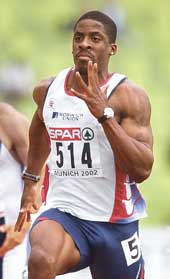 |
| Traces of tetrahydrogestrinone (THG) were found in one of Chambers’ urine samples during an out-of-competition test at his training base in Germany |
London: European champion sprinter Dwain Chambers has tested positive for a banned anabolic steroid.
One of Britain’s best hopes for a gold medal at next year’s Olympic Games, Chambers allegedly failed a test for the newly discovered drug tetrahydrogestrinone (THG) which, until last week, was thought to be undetectable.
Traces of the drug were found in a urine sample that the European 100 metres champion and record holder provided during an out-of-competition test at his training base in Saarbrucken, Germany, on August 1. Chambers is reported to have returned a positive ‘A’ sample. A second, or ‘B’ sample, is yet to be tested.
If Chambers were to fail that test he would be banned from athletics for two years and from the Olympic Games for life.
Chambers’ lawyer Graham Shear refused to answer questions but issued a statement insisting his client had not knowingly taken a banned substance.
“He will not accept nor tolerate any accusations or implications that this was a wilful or calculated attempt on his behalf to deceive the authorities,” Shear told reporters.
“In his eight years in international athletics, he has never been tempted to succumb to illegal methods of enhancing a performance.”
The athlete’s US-based Ukrainian coach, 71-year-old Remi Korchemney, said he hadn’t spoken to Chambers but angrily denied that the runner would test positive for a steroid.
“This is not something the public should just accept,” Korchemney told the San Jose Mercury News.
“Can you say someone is guilty without a judge and jury? You are supposed to be innocent until proven guilty.”
The reports that Chambers had tested positive came a day after the IAAF said all urine samples from the Paris World Athletics Championships in August would be re-tested.
Athletics’ governing body took the decision following an announcement by the US Anti-Doping Agency (USADA) last Thursday that several American athletes had tested positive for a new steroid tetrahydrogestrinone (THG).
The positive samples were found in the re-testing of 350 doping samples from the US athletics championships in June.
“I know of no other drug bust that is larger than this involving the number of athletes we have involved, certainly in the anabolic steroid area,” said USADA chief executive officer Terry Madden.
“This is a conspiracy involving chemists, coaches and certain athletes using what they developed to be ‘undetectable’ designer steroids to defraud their fellow competitors and the American and world public who pay to attend sports events.”
A test for the drug was discovered by the IOC-accredited laboratory in Los Angeles after an unidentified man sent them a syringe containing THG. Madden said the man, who said he was a high-profile coach, called the USADA in June alleging that leading track and field athletes were using the steroid because no test existed.
Meanwhile, the method for detecting THG is being sent to IOC-accredited laboratories throughout the world, the WADA said on Wednesday. The distribution of the test for THG means 30 laboratories will be able to test for the latest sophisticated doping device.
Kallon tests positive
Meanwhile, a report from Milan, Inter Milan striker Mohammed Kallon has tested positive for the banned steroid nandrolone following a random drugs test, the Italian Olympic Committee (CONI) said on Wednesday. The test was carried out after Inter’s 0-0 draw at Udinese on September 27.The 24-year-old Sierra Leone forward is likely to be suspended by his club pending a second test. If he is found guilty, Kallon could face a lengthy suspension. (AGENCIES)










